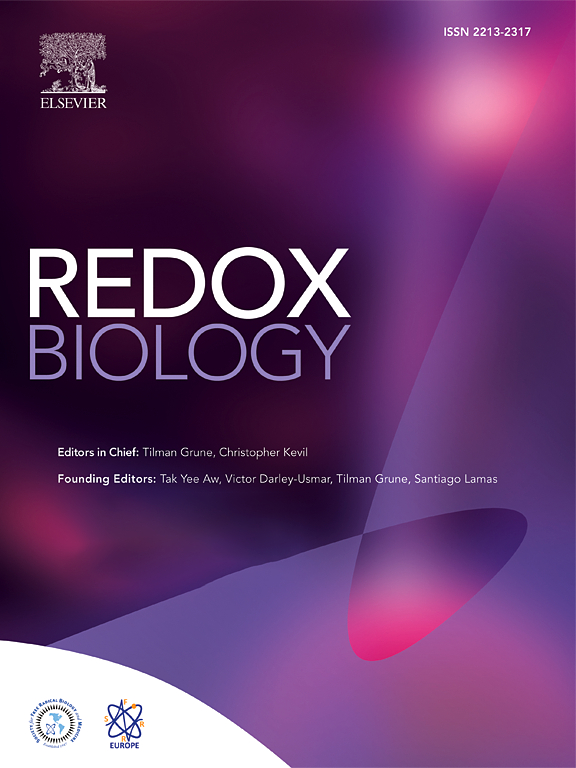辐射诱导的巨噬细胞衣康酸上调通过稳定NRF2蛋白和抑制免疫应答促进非小细胞肺癌的放射耐药
IF 10.7
1区 生物学
Q1 BIOCHEMISTRY & MOLECULAR BIOLOGY
引用次数: 0
摘要
放射耐药是导致非小细胞肺癌局部复发和远处转移的重要原因之一。衣康酸主要作为巨噬细胞的抗炎代谢物,然而,其在放疗中的作用仍有待探讨。在这项研究中,我们证明了辐射显著增加肿瘤微环境(TME)中的衣康酸,这是由巨噬细胞产生的。在机制上,NF-κB信号通路在巨噬细胞中被迅速激活,从而增强P65与Acod1启动子区域的结合,导致衣康酸分泌显著增加。过量衣康酸通过稳定NRF2蛋白来缓解NSCLC细胞系的氧化应激。值得注意的是,特异性敲除髓细胞上的Acod1可增强肿瘤免疫微环境对放疗的激活,特别是增加CD8+ T细胞的浸润和激活。因此,我们认为靶向Acod1可能是提高NSCLC放射敏感性的有效策略。本文章由计算机程序翻译,如有差异,请以英文原文为准。
Radiation-induced upregulation of itaconate in macrophages promotes the radioresistance of non-small cell lung cancer by stabilizing NRF2 protein and suppressing immune response
Radioresistance is one of the important reasons for local recurrence and distant metastasis in non-small cell lung cancer (NSCLC). Itaconate primarily functions as an anti-inflammatory metabolite in macrophages, however, its role in radiotherapy remains to be explored. In this study, we demonstrated that radiation significantly increases itaconate in the tumor microenvironment (TME), which is produced by macrophages. Mechanistically, the NF-κB signaling pathway is rapidly activated in macrophages, which enhances the binding of P65 to the Acod1 promoter region, leading to significantly increased secretion of itaconate. Excessive itaconate alleviates oxidative stress of NSCLC cell lines by stabilizing NRF2 protein. Notably, specifically knocking out Acod1 on myeloid cells enhances the activation of the tumor immune microenvironment in response to radiotherapy, particularly increasing the infiltration and activation of CD8+ T cells. Therefore, we propose that targeting Acod1 could be an effective strategy to improve radiosensitivity in NSCLC.
求助全文
通过发布文献求助,成功后即可免费获取论文全文。
去求助
来源期刊

Redox Biology
BIOCHEMISTRY & MOLECULAR BIOLOGY-
CiteScore
19.90
自引率
3.50%
发文量
318
审稿时长
25 days
期刊介绍:
Redox Biology is the official journal of the Society for Redox Biology and Medicine and the Society for Free Radical Research-Europe. It is also affiliated with the International Society for Free Radical Research (SFRRI). This journal serves as a platform for publishing pioneering research, innovative methods, and comprehensive review articles in the field of redox biology, encompassing both health and disease.
Redox Biology welcomes various forms of contributions, including research articles (short or full communications), methods, mini-reviews, and commentaries. Through its diverse range of published content, Redox Biology aims to foster advancements and insights in the understanding of redox biology and its implications.
 求助内容:
求助内容: 应助结果提醒方式:
应助结果提醒方式:


